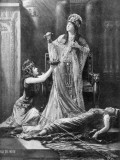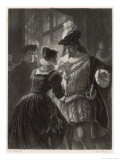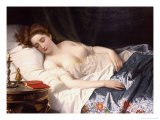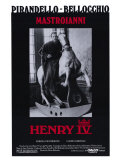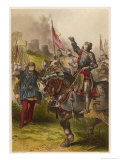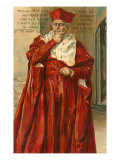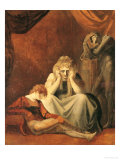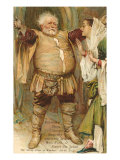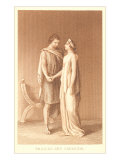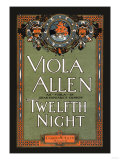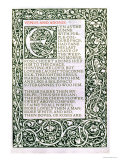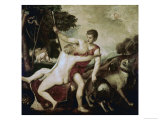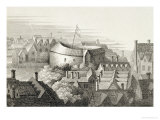|
'Anthony and Cleopatra' is a tragedy play based on the Thomas North translation of Plutarch's Life of Marcus Antonius.
• Lily (Lillie) Langtry
|
|
|
|
All's Well That Ends Well is considered one of Shakespeare's “problem plays” as it is difficult to decide if it is a comedy or a tragedy: in short, the orphan Helena manages to manuever Bertram into being a good husband.
The All's Well That Ends Well title is based on the proverb meaning that difficulties do not matter as long as the outcome is good.
|
|
|
|
Cymbaline is the king and his daughter Imogen (or Innogen) has secretly married a commoner named Posthumus. One of the scenes in the play is about a ‘friend’ of Posthumus spying on Imogen as she sleeps.
Geoffrey of Monmouth wrote a tale about real life monarch named Cunobelinus, which appears to be inspiration to Shakespeare, as well as elements from Boccaccio's Decameron.
|
|
|
|
Henry IV (1 & 2) are categorized as history plays and part of Shakespeare's major tetralogy of Richard II; Henry IV, Part 1; Henry IV, Part 2; Henry V.
|
|
|
|
Henry V is believed to be written c.1599.
It tells the story of King Henry V, focusing on events immediately before and after the Battle of Agincourt (1415) during the Hundred Years' War.
... We few, we happy few, we band of brothers;
For he to-day that sheds his blood with me
Shall be my brother; ...
St. Crispin's Day Speech, before the Battle of Agincourt, act IV scene iii
• The River Somme
|
|
|
|
|
|
|
|
|
|
The comedy, The Merry Wives of Windsor (c. 1597-1602) features Sir John Falstaff, a fat, aging knight and his attempt to allievate his finacial straits by courting two wealthy (and married) women. The women compare the courting letters Falstaff sent them, discover the similarity and decide to amuse themselves. The Merry Wives of Windsor is Shakespeare's only play to deal exclusively with contemporary English middle class life in the Elizabethan era. The play has been adapted for the opera by several composers including Giuseppe Verdi.
• more Falstaff posters
|
|
|
|
Troilus and Cressida (c. 1602) is a tragedy described as one of Shakespeare's “problem plays”, since the protagonist, Troilus, does not die.
Set in the later years of the Trojan War, the play has two plotlines - the action of the Iliad from Achilles' refusal to participate in battle to Hector's death, and the love affair of Trojan prince Troilus and Cressida.
|
|
|
|
Twelfth Night, a comedy written as entertainment for the end of the Christmas season, was first performed at Candlemas, 1602.
The play is set in Illyria, describe as an ancient area on the eastern coast of the Adriatic, and the plot is one based on mistaken identity.
“Be not afraid of greatness: some are born great, some achieve greatness, and some have greatness thrust upon them.” Malvalio in act II, scene i
• Viola Allen photo
|
|
|
|
Venus and Adonis is a poem based on sections from Ovid's Metamorphoses. It is thought Shakespeare may have seen Titian's painting of Adonis refusing the embrace of Venus, the goddess of Love.
FYI - William Morris was a leader in the Arts and Crafts movement.
|
|
|
|
|





